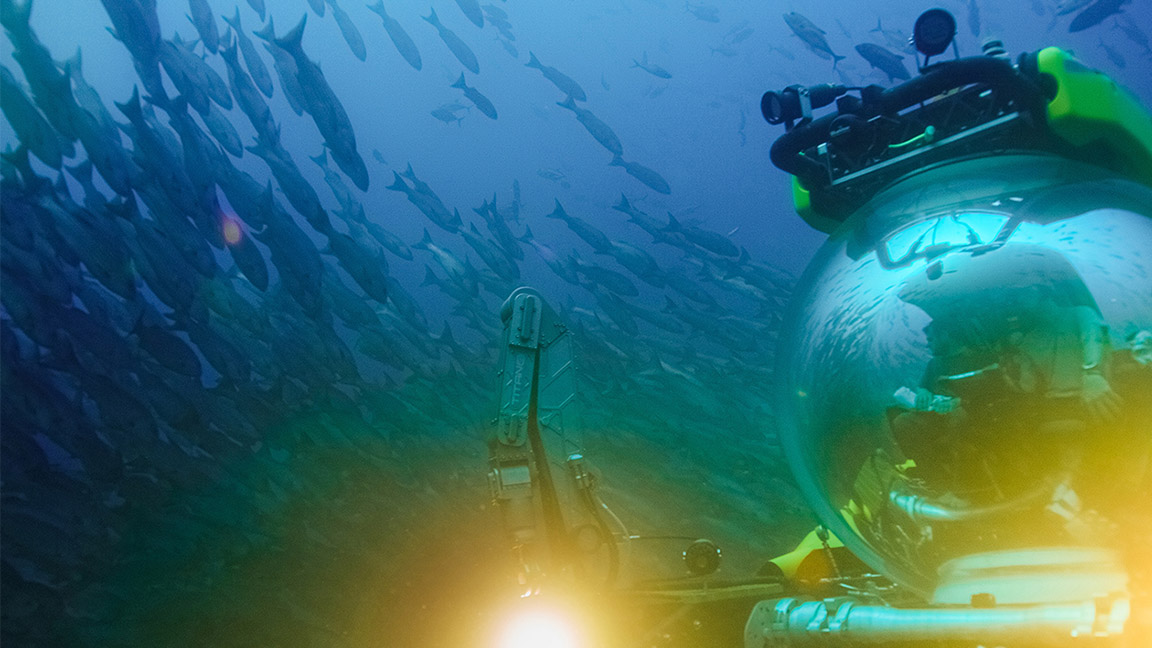New immersive experiences are popping up with regularity and captivating people of all ages and interests. The OceanXperience is one of those. Conceptualized in 2022—when exhibition producer Flying Fish and the ocean exploration organization OceanX partnered for innovative, underseas storytelling—it is a traveling exhibition based on a forthcoming television series produced by BBC Studios Natural History Unit and OceanX in association with Earthship Productions for National Geographic.
[Panasonic Delivers Next-Level Projection Mapping at Napa Festival]
OceanXperience opened in February 2024 at the Arizona Science Center in Phoenix. Multimedia company Fivestone Studios was charged with bringing the exhibit to life at the center, and it certainly has quite a bit for every Pro AV lover. “The OceanXperience features a mix of projection mapping, traditional touch screens, holographic displays, and Microsoft HoloLens headsets,” explained Justin Eslinger, director of innovation, Fivestone Studios.
While OceanXperience is a fun and interactive journey, it is also meant to be an educational experience for those involved. Visitors (the "Xplorers") are given an RFID wristband to track their progress on one of three missions. One takes visitors on a study of humpback whales and includes a bridge mapping table, tagging station, and computer station to analyze data. Another mission takes visitors to the Bahamian waters to study great hammerhead sharks, complete with a mission control mapping table and submersible station that includes a coral reef and shipwreck. The last mission studies a group of orcas, and guests get to pilot drones and interact with a hologram station. Don't worry, casual Xplorers can take their time on a non-mission adventure as well.
"The goal was to have guests register their RFID bracelet and go on a guided mission throughout the exhibit,” explained Eslinger. “Fivestone Studios created a local Node.js server to store and process data on each interactive so that guests’ choices and progress could be evaluated at the end of their experience.”

Of course, there were a few challenges along the way. When Xplorers "board" the Zodiac—a small open-air boat for tracking—the replica tagging poll and sensors beneath the projection surface mimic an actual tagging experience. Anna Clark, head of marketing for Flying Fish, described the task as “incredibly challenging and rarely achieved on a first attempt.”
That HoloLab was the result of another challenge. OceanX wanted everyone to experience the HoloLenses, but with an expected throughput of 250-300 visitors per hour, that was logistically impractical. Not only would it require a bevy of headsets, you'd also need to factor in extra time for Xplorers to grasp how to use them.
Thus, the HoloLab Experience was born. The 10-minute facilitated experience with viewing windows and simulated Ncam live feed allows Xplorers to interact. Plus, this allows OceanX to restrict the HoloLenses to a secure and single location, which makes it easier to monitor the hardware and support visitors.
Another challenge was somewhat architecturally imposed: How do you make visitors feel truly immersed? "Typically, we try to use fewer walls with a traveling exhibition," Clark explained. "To achieve the look and feel of being on the ship, it was essential to develop a wall system that provided different spaces and rooms that mimicked the ship's walls. The wall system we developed is flexible and provides modularity for different gallery spaces.
"There is also the hangar door projection in the sub hangar, which features a 30-minute looping video of actual footage from the rear deck of OceanXplorer. The rear projection setup, with the video and audio, reinforces the notion that this state-of-the-art vessel is always active and operating.”
So, what are some of the Pro AV secrets behind this oceanic adventure?
“The photorealistic renderings, used for the HoloLens experience, mission debriefing projection wall, and the holographic displays, were brought to life using 3DS Max,” said Eslinger. “All of the interactives were created with Unity using in-house tools and assets from Unity’s Marketplace. These applications run on high-end Windows computers that are directly connected to the displays."
For the whale tagging station, Unity’s Universal Render Pipeline (URP) and custom shaders were used to make performant photorealistic real-time graphics that responded to the user’s physical tagging pole. "This real-time rendered output was projection mapped to the exhibit’s walls to create a 3D look from where the user is standing," Eslinger added.
Through Unity, Fivestone Studios was able to focus on the programming and user interfaces to truly enhance the user experience, one that has been positively received thus far. It also used Figma, a cloud-based collaborative design platform, that allowed its global team to contribute to design and execution.
[Amelia Earhart Hangar Museum Takes Flight]
As with any immersive exhibit, projection mapping plays a key role. The Tagging Station is powered by an Epson L635SU short-throw projector, an interactive projection microscope uses a Panasonic PT-VMZ71BU7, the sub hangar deploys a Panasonic PT-RCQ80LWU, and the mission debriefing uses a Panasonic PT-MZ780BU. Flying Fish also provided an oceanic soundscape throughout the exhibit.
"Overall, we are extremely pleased with the result of the exhibit,” said Eslinger. “It was a fun challenge that we hope will inspire the next generation of scientists and explorers.”

